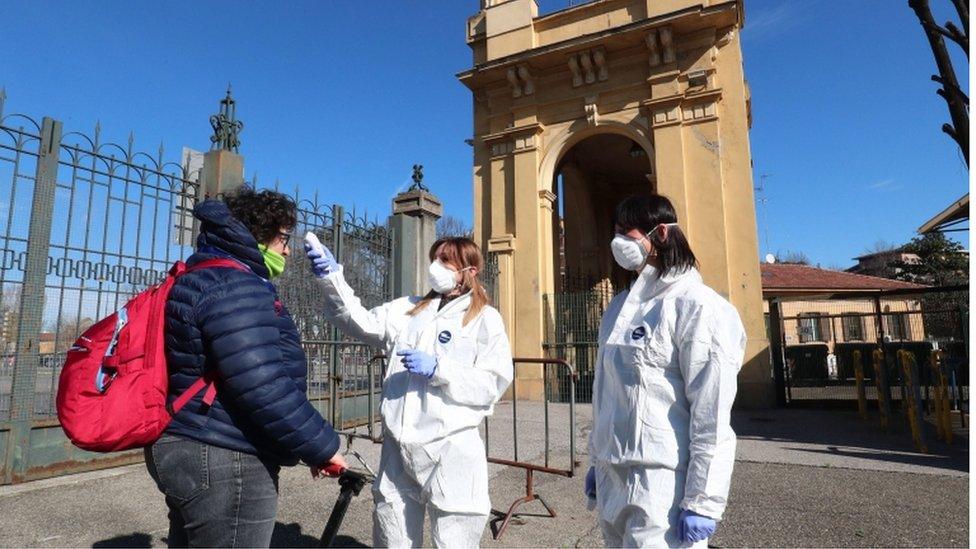'People are paranoid' - Life on lockdown in Italy
- Published
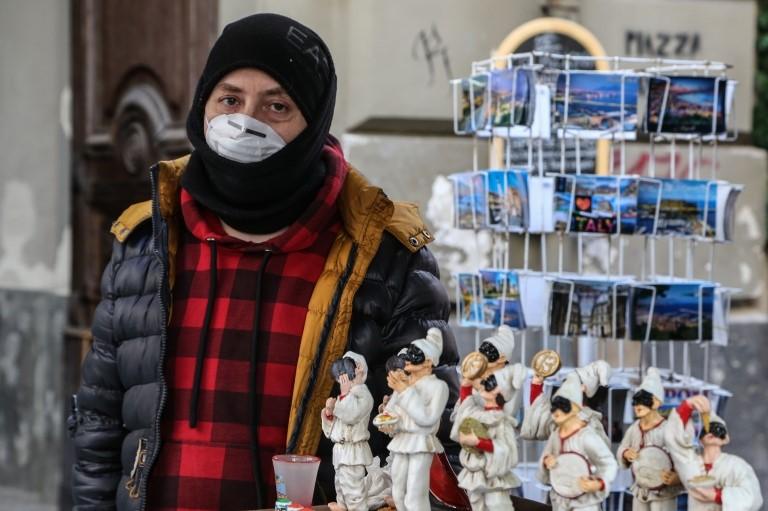
Vendors have still been out on the streets in Naples
There is anxiety and confusion on the ground as Italy implements its most restrictive measures since World War Two in its battle against the coronavirus.
Prime Minister Giuseppe Conte has called the outbreak the country's "darkest hour" as measures, which include travel restrictions and a ban on public gatherings, are enacted across Italy.
A wide range of restrictions have been put in place.
Travel has been restricted but exemptions will be given to those with valid reasons
Bars and restaurants can remain open from 06:00 to 18:00, but must put a distance of at least one metre between customers
Shops also have to make sure customers remain at least a metre apart
Cinemas, theatres and museums have been ordered to close
All ski resorts will be closed until further notice
All sporting events - including football matches - are suspended nationwide
Schools and universities will remain closed until 3 April
All public gatherings will be forbidden, including weddings, funerals and baptisms
But people in Italy have told the BBC that there is widespread confusion on the ground regarding how the "lockdown" is being implemented.
"No one is really sure what's happening, we just know that you're not allowed to travel in and out of cities," said Emily Millington, a teacher in Bologna.
"But they've not actually made it clear if you can go out and about, if you'll get in trouble for that, or if you should just stay at home."

Emily Millington is a teacher in Bologna
Ms Millington drove three hours from Bologna to her boyfriend's house in the northern town of Trento early on Tuesday, where they are self-isolating.
"You've got people who don't know if they've got it, like me. I don't really know what's happening," she said.
"I know they won't swab me because I've not got symptoms, but I've come into contact with people that have got it," she said.
"It's just a waiting game."
While she has been able to work from home, Ms Millington said the outbreak had led some of her private language school's competitors to shut down.
"Employers are trying to hold on until the last moment," she said.

EASY STEPS: What can I do?
A SIMPLE GUIDE: What are the symptoms?
IMMUNITY: Are women and children less affected?
MAPS AND CHARTS: Visual guide to the outbreak
VIDEO: The 20-second hand wash

Dan Davison, a teacher in Puglia in the south-east, said that there had been an announcement saying that people needed to justify why they were out of the house, but he hadn't seen it being enforced.
"I know it's unprecedented, but there's been no clear message whatsoever," he said, adding that Puglia was like a "ghost town".
"It seems, to a certain degree, that people are making it up as they go along. For example, you hear from other people that there is a new rule, but you look for it online you can't find it anywhere," he said.
"It's very unclear."
Mr Davison said the decision by airlines including Ryanair and British Airways to cancel all international flights to and from Italy had made him feel "stranded".

Dan Davison said there is widespread confusion
In Bologna, Ms Millington said the outbreak was affecting the atmosphere of some social circles.
One woman she knows had a fever but didn't ring the designated hotline, so her friend did.
"It's really strange here, people are kind of snitching on each other," she said.
"We were joking about it last night. You want to meet up with your friends but then you're like 'who have they come into contact with?'" she added.
"You're kind of paranoid."
Ms Millington said she knew that some people were not disclosing the fact they had a fever because they were worried about the social stigma.
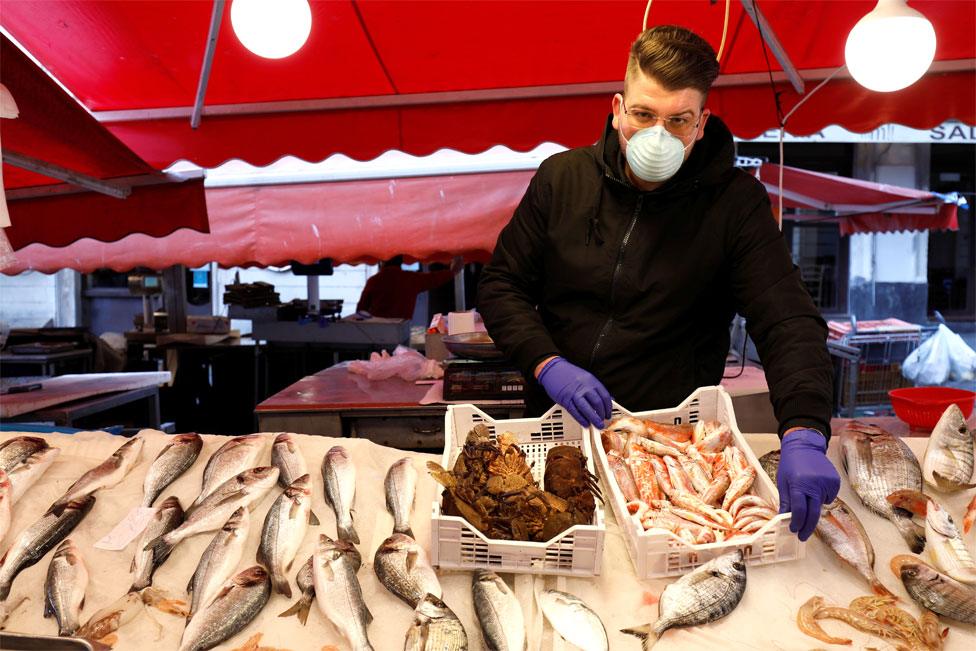
A fish market in Catania, Sicily
Tansy Ball, who has lived on the island of Sicily since 1977, said there appeared to be a spike in cases after people started returning to their families in the south from heavily hit northern areas after universities were shut.
Close familial bonds between older and younger generations could actually make things worse, she said.
"Being a family-run country, you're still going to let your daughter, nephews, nieces and grandchildren into your house," she said.
"People have been discouraged from going to the nursing homes... but whether they will or not, I don't know."
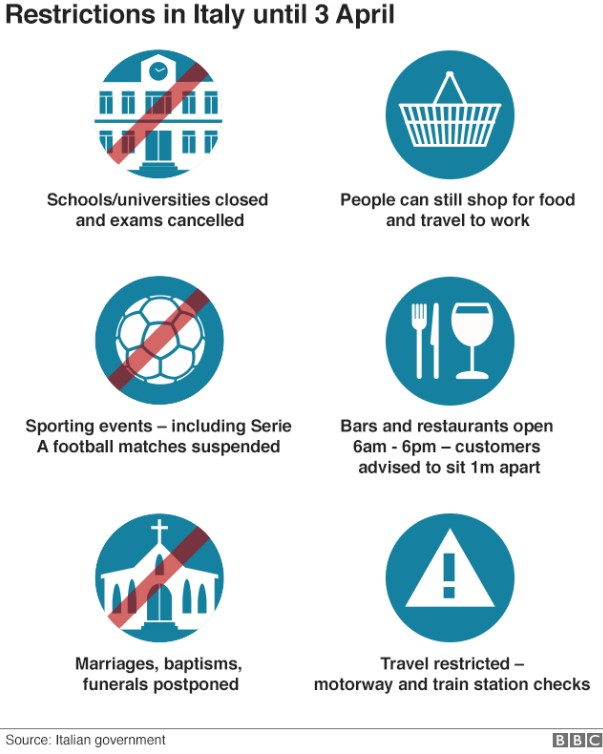
But despite the panic, Ms Ball said she was taking the lockdown in her stride.
"I don't do anxiety, I let everyone else worry. I think if I get it I will be able to recover," she said.
"I've got plenty to do. Things to study, books to read, I've got a house I could paint if I wanted to. I'm allowed out to do the shopping and to go for a bike ride because I'm not meeting anybody if I do that," she added.
"I'll just take it as it comes."

- Published28 September 2020
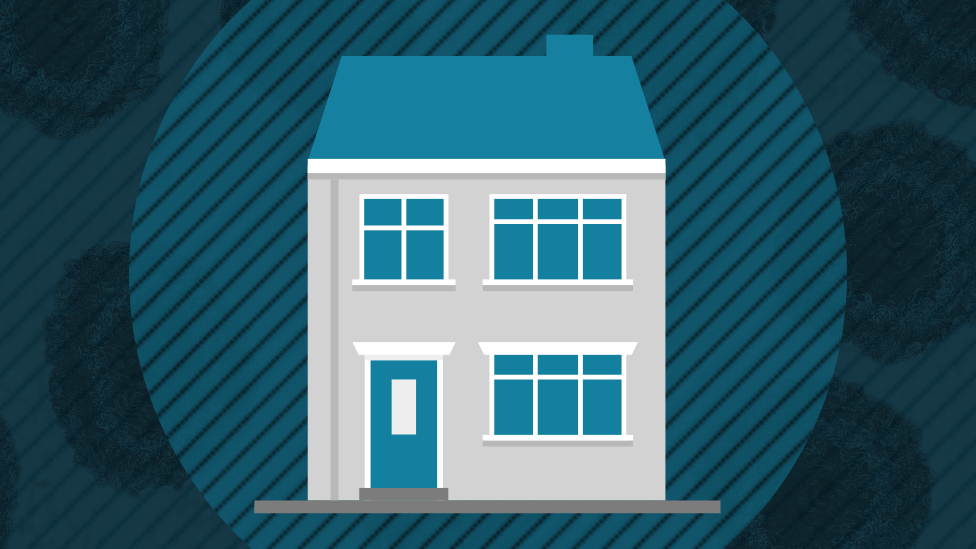
- Published28 February 2020
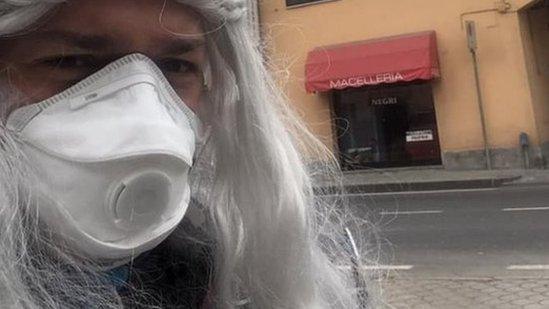
- Published8 March 2020
